Norwegian Association for Women's Rights
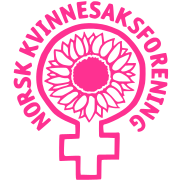 | |
| Formation | 28 June 1884 |
|---|---|
| Founders | Gina Krog and Hagbart Berner |
| Type | Political advocacy |
| Headquarters | Majorstuen, Oslo |
President | Marit Nybakk |
| Affiliations | International Alliance of Women, Norwegian Women's Lobby, Forum for Women and Development |
| Website |
kvinnesak |
The Norwegian Association for Women's Rights (Norwegian: Norsk Kvinnesaksforening, NKF) is a Norwegian nonpartisan political advocacy organisation and Norway's oldest and preeminent women's and girls' rights organisation.
It was founded in 1884 on the initiative of Gina Krog and Hagbart Berner by 171 prominent women and men, including five Norwegian Prime Ministers. Its basic principle is that full and equal enjoyment of human rights is due to all women and girls, and it works to advance women's social, economic and political situation in Norway as well as internationally. Historically associated with the Liberal Party, the NKF is today broadly representative of the political spectrum. The association has successfully campaigned for women’s right to education, the right to vote, the right to work and the establishment of what is now the Gender Equality and Anti-Discrimination Ombud, and currently focuses on the implementation of the CEDAW convention and women's human rights more broadly.
The current President is Marit Nybakk, who is also First Vice-President of the Norwegian Parliament. The NKF is a member of the International Alliance of Women (IAW), which has general consultative status to the United Nations Economic and Social Council and participatory status with the Council of Europe. The NKF is also a member of the Norwegian Women's Lobby and the Forum for Women and Development. Several of the NKF's early leaders, among them the noted humanitarian Fredrikke Marie Qvam, were married to Norwegian prime ministers. Its postwar leaders include Liberal Party leader and cabinet minister Eva Kolstad, supreme court justice Karin M. Bruzelius and the former chairman of UNICEF, Torild Skard. Its honorary members include Camilla Collett and Norway's first female Prime Minister Gro Harlem Brundtland. NKF's offices are located at Majorstuen in Oslo.
History
The organisation was founded in 1884 by 171 prominent Norwegians, led by the liberal politician and women's rights pioneer Gina Krog and liberal Member of Parliament and the first editor-in-chief of Dagbladet Hagbart Berner. From its establishment and well into the 20th century, the organisation was strongly associated with the Liberal Party; its 171 founders included several Norwegian Prime Ministers, leaders of the Liberal Party and many liberal Members of Parliament as well as the editors of the large liberal newspapers and public figures such as novelist Alexander Kielland. Three of the first Presidents of the organisation, Anna Stang, Randi Blehr and Fredrikke Marie Qvam, were all wives of Norwegian Prime Ministers. Membership has always been open to both men and women.
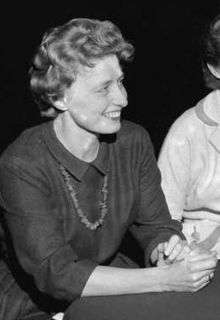
Among the important causes that the NKF has campaigned for are women's suffrage (achieved in 1913), the right to work (in the 1930s), abolishment of the common taxing for spouses (the 1950s), right to equal schooling (the 1960s), the establishment of the Council for Equality between the Sexes (Norwegian: Likestillingsrådet) 1972, later replaced by the Centre for Equality between the Sexes (1977), later by the Equality and Anti-Discrimination Ombud (2006). Members of the organization, such as its long-time chairman Eva Kolstad, who served on the United Nations Commission on the Status of Women, also pioneered United Nations gender equality policies.
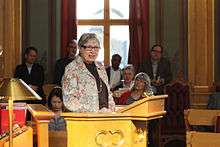
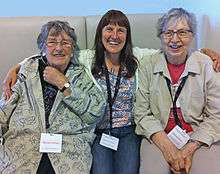
The association also initiated the establishment of the Norwegian Women's Public Health Association (Norwegian: Norske Kvinners Sanitetsforening), a humanitarian organisation, which grew to become Norway's largest women's organisation with around 250,000 members at one point. Historically, the NKF was the most important association of the Norwegian bourgeois (or liberal) women's movement (associated chiefly with the Liberal Party), in contrast to the labour women's movement (associated with the Labour Party). Today, it is a nonpartisan organisation, focusing on women's political, legal and human rights as well as equal opportunities, and on the implementation of the Convention on the Elimination of All Forms of Discrimination Against Women in particular.
The NKF has co-operated with the National Association for Women's Suffrage and later with the Norwegian National Women's Council. Some of the prominent post-war leaders were Eva Kolstad, who later became a cabinet minister, leader of the Liberal Party and the world's first Gender Equality Ombud, Karin M. Bruzelius, who became a supreme court justice, and former UNICEF Chairman Torild Skard.
The Norwegian Association for Women's Rights has been affiliated with the International Alliance of Women (IAW) since 1904 and is a member of the Norwegian Women's Lobby and the Forum for Women and Development. It addresses the United Nations Economic and Social Council through its IAW membership.
The organisation had its offices in Sehesteds gate 1 in Oslo for many years, and now has its offices in Majorstuveien 39 at Majorstuen in central Oslo.
Presidents
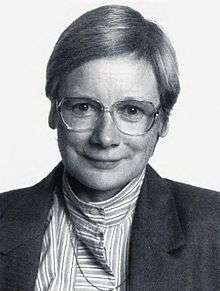
.jpg)
- Hagbart Berner 1884–1885
- Anna Stang 1885–1886
- Ragna Nielsen 1886–1888
- Anna Bugge 1888–1889
- Ragna Nielsen 1889–1895
- Randi Blehr 1895–1899
- Fredrikke Marie Qvam 1899–1903
- Randi Blehr 1903–1922
- Aadel Lampe 1922–1926
- Fredrikke Mørck 1926–1930
- Anna Hvoslef 1930–1935
- Kitty Bugge 1935–1936
- Margarete Bonnevie 1936–1946
- Dakky Kiær 1946–1952
- Ingerid Gjøstein Resi 1952–1955
- Marit Aarum 1955–1956
- Signe Swensson 1956
- Eva Kolstad 1956–1968
- Clara Ottesen 1968–1972
- Kari Skjønsberg 1972–1978
- Karin M. Bruzelius 1978–1984
- Sigrun Hoel 1984–1988
- Irene Bauer 1988–1990
- Siri Hangeland 1990–1992
- Bjørg Krane Bostad 1992–1994
- Kjellaug Pettersen 1994–1998
- Siri Hangeland 1998–2004
- Berit Kvæven 2004–2006
- Torild Skard 2006–2013
- Margunn Bjørnholt 2013–2016
- Marit Nybakk 2016–
Gina Krog Prize
Since 2009, the association has awarded the Gina Krog Prize, named after its co-founder and first Vice President Gina Krog.
The prize has been awarded to
- Historians Ida Blom, Gro Hagemann, Elisabeth Lønnå, Aslaug Moksnes and Elisabeth Aasen (2009)
- Filmmaker Anja Breien (2010)
- Tove Smaadahl (2012)
- Kirsti Kolle Grøndahl (2014)
- Amal Aden (2016)
Honorary members
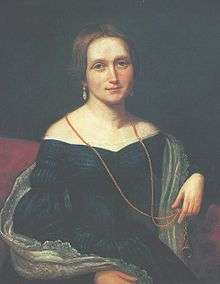
- Camilla Collett (1884)
- Aasta Hansteen (1904)
- Aadel Lampe (1926)
- Dorothea Schjoldager
- Fredrikke Mørck (1934)
- Katti Anker Møller (1939)
- Margarete Bonnevie (1946)
- Dakky Kiær (1954)
- Signe Swensson (1954)
- Eva Kolstad
- Ebba Haslund (1995)
- Berit Ås (2009)
- Torild Skard (2014)
- Gro Harlem Brundtland (2016)[1]
References
- ↑ "Gro Harlem Brundtland utnevnt til æresmedlem av Norsk Kvinnesaksforening". Norwegian Association for Women's Rights. 21 May 2016. Retrieved 21 May 2016.
Literature
- Aslaug Moksnes. Likestilling eller særstilling? Norsk kvinnesaksforening 1884–1913, Gyldendal Norsk Forlag, 1984, 296 pages, ISBN 82-05-15356-6
- Elisabeth Lønnå: Stolthet og kvinnekamp: Norsk kvinnesaksforenings historie fra 1913, Gyldendal Norsk Forlag, 1996, 341 pages, ISBN 8205244952